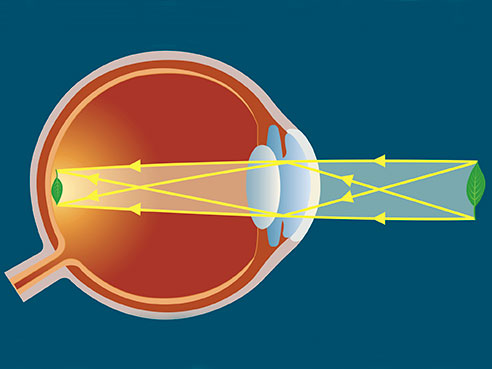 New research from the School of Optometry has been awarded $1.81 million by the National Institutes of Health’s National Eye Institute to advance imaging of the eye’s photoreceptors and understand how color perception is ultimately achieved in the brain.
New research from the School of Optometry has been awarded $1.81 million by the National Institutes of Health’s National Eye Institute to advance imaging of the eye’s photoreceptors and understand how color perception is ultimately achieved in the brain.
Lawrence Sincich, Ph.D., assistant professor in the Department of Vision Sciences, explained that his five-year R01 grant will allow him to image photoreceptors in real time while simultaneously stimulating them, giving him the ability to map the color sensitivity of any one of them.
“Our eyes have millions of photoreceptors, which are specialized cells that line the retina in the back of the eye,” Sincich said. “We currently don’t have a handle on how each photoreceptor gets turned into an everyday perception by the brain, so our work is designed to move toward that goal.”
With a full understanding of how the brain works still unknown, Sincich said his work will lead to further basic knowledge.
“Our techniques give us the only opportunity for studying a sensory system at the cellular level,” Sincich said. “Once you’re working at the cellular level, you can build a foundation for understanding the much more complex biology of vision.”
Sincich said success from his current efforts could potentially lead to more precise assessments of retinal function, particularly during the course of eye disease.
“We’ll have a test that operates at the cellular level that will tell us, for instance, if a therapeutic drug is working on the exact part of the retina we’re trying to cure,” he said. “This kind of test goes well beyond the eye charts we’re used to for telling if someone’s vision is getting better or worse.”
Om P. Srivastava, Ph.D., professor and interim chair of UAB Vision Sciences, said this work will benefit ophthalmologists and scientists who are studying normal and diseased photoreceptor functions and the neural basis of color vision.
“Dr. Sincich’s research will probe the perceptual changes associated with retinal diseases and colorblindness, as well as assess the effectiveness of gene therapy – an innovative way to treat diseases – being developed for retinal disorders,” Srivastava said.
The award funding this research will last through July 31, 2018.
